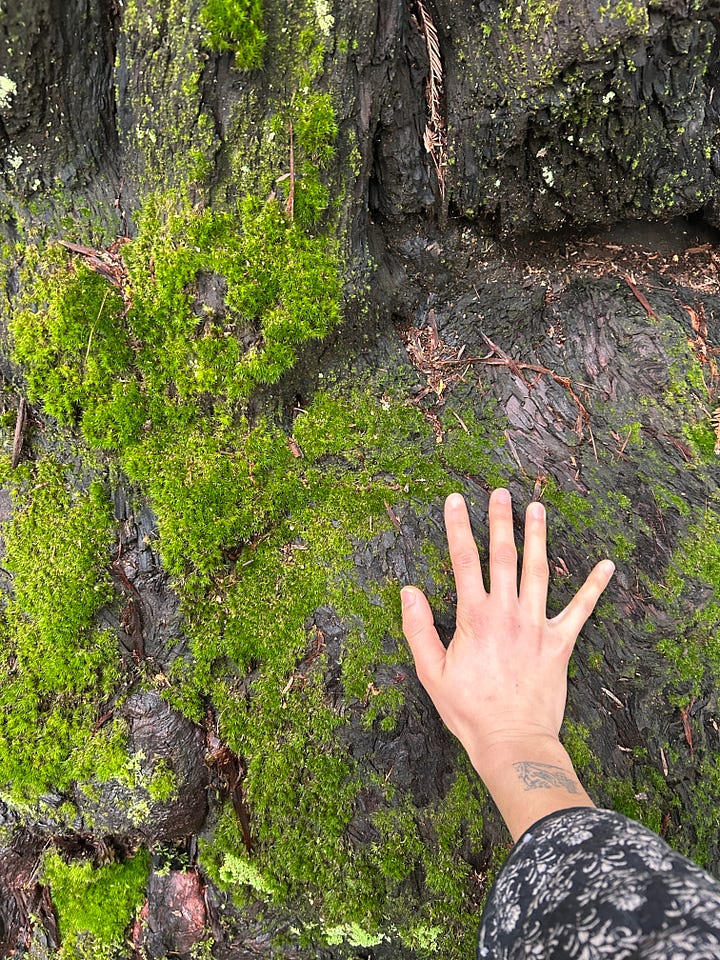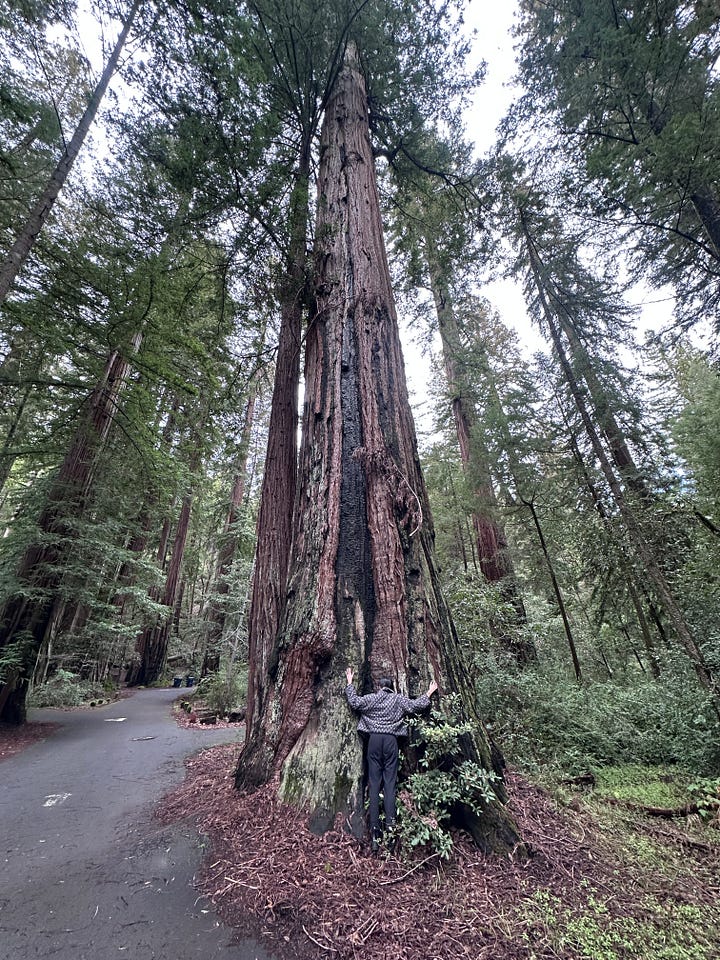That humid June day we brought River home from the hospital, I sat beside him in the backseat of the car and watched his hands ripple the air. His fingers, shriveled and pink as strawberry fruit leather, moved as if through water. They undulated in a series of mudras, the graceful poses of Indian classical dance. They played the invisible strings of a sitar, strumming aquatic arias that only he could hear—an ancestral song encoded in the metacarpals. The hands remembered the dream of where he just was, where a part of him would always belong. That unshakeable sense of home residing in those grasping fingers, even as he entered a new world.
I think of this as I walk down the street in Los Angeles, on the first night of our last leg of tour. I’m feeling jet-lagged and sad, missing my family, missing the maple trees and the almond light that flows among them in the morning. It’s a different world out here—a world of loquat and palm, of bungalow and bougainvillea. My heart feels as sour as the citrus dotting the trees along Olympic Boulevard.
As I walk, I suddenly realize that my fingers are tapping the air, unconsciously playing the keys of a piano. I catch myself doing this sometimes, the music moving through me even in silence, even against the crackle and smash of city construction, the Koreatown clatter. It connects me back to something essential. My hands remember the home I carry with me always.
The tour is done, the album cycle is done, and now I face the opening of everything. I can almost taste the brine in the air as the oyster shell of my life parts to a clean sea breeze. The pearl inside is this: a clear understanding, for the first time in my life, of what I’m here to do.
Throughout my music career, I’ve always had the worst stage fright. It clutched at my throat and made it impossible for me to sing the way I do when I’m alone at home. It numbed my fingers, stiffening them into saws that hacked at all the wrong keys. These were full body, no-holds-barred nerves, and I came to dread their companionship at every performance.
During dress rehearsal for the Maypole album release show last fall, I tried beta blockers for the first time, thinking this was the magic answer. It wasn’t; it made my mouth cottony and dry, as if the word for the pill itself—propranolol—was filling my cheeks with gauze. I didn’t know how I was going to get through the show, which was my first real performance in years, in my hometown, in front of hundreds of friends, family, and community members.
But then, when I stepped on stage, something miraculous happened. The nerves were gone. And throughout the rest of the tour—aside from a few instances of normal surface-level jitters—they did not come back. The air rippling freely across my vocal chords felt like a rock being lifted on a butterfly’s wing.
Making music, I realize now, had become so tied up with ambition for me, with hitting the next milestone. My own standards and metrics of success bobbing ahead of me like a swinging lantern so that I always felt just a little outside of its glow. There was always a sense that I needed to prove something in performance, to earn something: attention, accolades, the next big opportunity. I never felt good enough.
But that’s not how or why I started making music. Back when I was fourteen and began calling myself a songwriter, staking my identity in it, it wasn’t about getting recognition or fame or climbing the ladder. It was about healing. My parents had just split up, my father had moved out, and I was a lonely, awkward adolescent just trying to patch the holes in my world.
Presenting the Maypole brought me back to that place. With these shows, I felt there was nothing to prove, because it wasn’t about me. It was about drawing a sacred circle around that room and inviting people to step inside—to grieve, to wail, to laugh. To heal.
When we find ourselves in total alignment, there is no nervousness, no fear. There is only a sense of coming home. It is a kind of freedom—freeing ourselves from the uncomfortable containers of our past. It’s as if when we find that alignment with our purpose, our bodies are remembering something essential, bringing us closer to the center of ourselves, back to the source.
These shows were a reminder that even more than a musician, I am a healer. That for me, singing is an act of service. There is no more need for hustling or pushing, no need for not-enough-ness. My ambition has shifted, the violent dragon of desire tamed down into a warmth that ripples my fingers—an energy I can harness like a spell.
I see now that these weren’t performances at all. These were remembrances.
The day after our show in San Francisco, we cross the Golden Gate Bridge and emerge in the gorgeous wilds of Marin County. The wildflowers are just beginning to peek out, fat splotches of yellow gleaming like butter pats in the hills. Somebody puts on Tom Petty. You belong among the wildflowers, Tom sings, and my bandmate says it sounds like a hymnal. Wind groans through a crack in the van door. Outside, the purple grasses are flattened as if in prayer. You belong somewhere you feel free.
I take a nap and wake up in the redwoods. The only time I’ve ever experienced the redwoods has been on tour. Whenever we drive this stretch of 101, we stop to stretch our legs and hug a tree. In the past, I’ve always been giddy with the bigness of them, but today, it’s a different experience. It’s not so much the visual that stuns me, it’s the sound. The cool muffling of the world, the ricochet of passing traffic falling away, all of it absorbed in the heartwood. It feels like drawing back into the womb.
I approach one of the redwoods and wrap my arms around her. My hands grasp the lichen-filled fissures of her body, fingers tapping music into the moss.
It is a balm. It is a hymn. It is the memory of a home I carry with me always.







